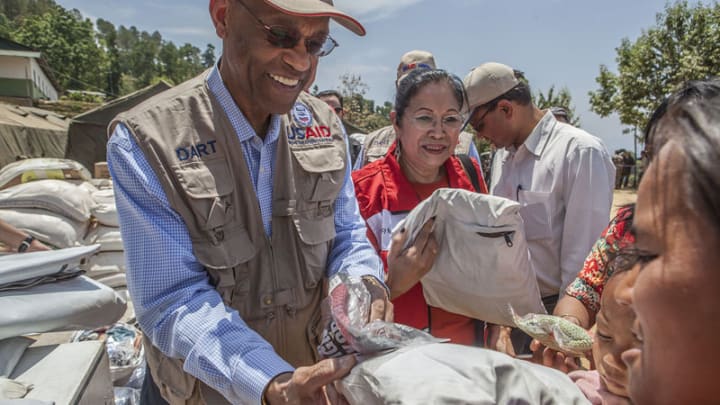
Much has already been said about Americans’ skewed perception of foreign spending, but to what extent is it true? A recent poll conducted by Ipsos in 17 foreign aid donor countries including the United States found that 63 percent of Americans think that foreign aid spending should be higher than the current level, suggesting that America’s tolerance for spending is greater than the public discourse indicates.
Why is this? Is it a case of an overly vocal minority — the 16 percent of Americans who think that spending on foreign aid should be nothing at all? Or does the way foreign aid is framed have a significant impact on whether Americans perceive it positively or negatively?
The Ipsos poll also asked Americans to rate their level of agreement with a number of statements about foreign aid. Compared with respondents from other countries, Americans were more likely to support pragmatic statements about foreign aid and less likely to support statements emphasizing the moral obligation to supply it. For instance, 62 percent of Americans think that spending on foreign aid gives the United States influence in the global community, 65 percent think foreign aid is beneficial to the global economy, and 63 percent think foreign aid prevents international conflict.
On the other hand, while 68 percent of Americans agree that global equality is an important value, only 44 percent think that we have a moral obligation to help those less well-off than we are. The traditional argument for aid based on morality seems to be losing ground. Furthermore, with 86 percent of Americans agreeing that too much foreign aid money goes to corrupt governments, foreign aid is not necessarily seen as money well spent.
See more from this series:
► The SDGs: How will we know if we achieved them?
► Are the global goals within reach? When you invest in women, yes
► Promoting healthy lives, access to water and well-being for all
► Supporting democracy in closing space
► The hard questions in education: Why and how?
► Where should #globaldev community focus aid to end hunger?
If foreign aid was better spent, would Americans support spending more? It seems so. Tolerance for foreign aid spending was much higher among those who agreed that aid gives American influence, reduces conflict, and improves the global economy and much lower among those who disagreed. Of those who agreed that foreign aid helps the global economy, 73 percent think foreign aid spending should be above current levels. Among those who think foreign aid doesn’t help the global economy, 32 percent think foreign spending should be nothing at all.
The data shows that Americans do see the value to foreign aid spending and actually would support more spending than is currently in place. However, several of the ways in which foreign aid is currently perceived and branded presents a formidable barrier. How should we rebrand foreign aid?
1. Get rid of the morality argument.
Historically, foreign aid has been viewed as “the white man’s burden,” a moral obligation to lift the less fortunate out of poverty. The validity of the argument has been a subject of academic and political debate for decades. However, it no longer resonates with Americans. This is good news: The global development industry is under pressure to prove its worth in terms of effective programming and tangible outcomes.
2. Emphasize the ROI.
The data shows that the best thing we can do to rebrand foreign aid is to talk about the benefits of it to Americans. Foreign aid helps to maintain America’s status as a leading global power, but it also has other benefits for Americans. For example, inequity has often been cited as a trigger for extremism — foreign aid money that goes to reducing inequality may eventually lead to a reduction in conflict. In addition, 85 percent of Americans believe that it is important to preserve the planet for future generations. Foreign aid helps other nations help their future generations through increased health, environmental, and educational outcomes to name only a few, which in turn ensures the future of our planet as a whole.
3. Endorse aid publicly.
The U.S. government has put a lot of effort into providing accessible information about foreign aid to the public. Websites like explorer.usaid.gov and foreignassistance.gov are a great start, but they require people to look for information, which the average American is not likely to do. The U.S. Agency for International Development and its affiliates should speak more publicly about the benefits of foreign aid, with tangible examples, to American people.
In the end, the answer is yes, foreign aid does need to be rebranded. As long as Americans perceive foreign aid as aimless contributions which add to global corruption and waste and authority figures talk to them in the language of moral “correctness,” Americans will continue to be grudging supporters of international aid programs.
Visit the Ipsos news center to see the data and other articles in this series. Join the Devex community and access more in-depth analysis, breaking news and business advice — and a host of other services — on international development, humanitarian aid and global health.




